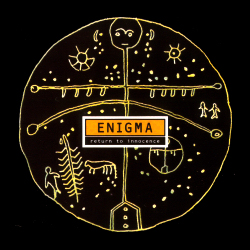History
The song's melodic and talking vocals in English are provided by Angel X (Andreas Harde), and a short talking vocal by Sandra ("That's not the beginning of the end, that's the return to yourself, the return to innocence"), while an Amis chant ("Weeding and Paddyfield Song No. 1") sung by folk music duo Difang and Igay Duana opens the song and is repeated throughout. Hailing from Taiwan, these Amis musicians were in a cultural exchange program in Paris in 1988 when their performance of the song was recorded by the Maison des Cultures du Monde and later distributed on CD. [1] [2] The producer of Enigma, Michael Cretu, later obtained the CD and proceeded to sample it. In addition, the drum beat of the song was sampled from the Led Zeppelin song "When the Levee Breaks", played by John Bonham. [3]
Legal dispute
In March 1998, Difang and Igay sued Cretu, Virgin Records and a number of recording companies for unauthorised use of their song without credit. [4] [5] The case was settled out of court for an undisclosed amount of money and all further releases of the song were credited (including royalties) to the Duanas. [6] Cretu has stated that he had been led to believe that the recording was in the public domain and that he did not intentionally violate the Duanas' copyright. [7]
Critical reception
Ned Raggett from AllMusic said that "Return to Innocence" is "not quite up there" with "Sadeness" in the popular culture in the US, "but almost inescapable elsewhere." [8] Larry Flick from Billboard magazine wrote that Enigma "resurfaces with a far more accessible, but no less cool pop/hip-hop kicker". He explained, "The track's insistent beat is good bait for a song that is chock-full of unusual male chants and breathy female vamping. Somewhere between the two is an irresistible hook and melody that assures much-deserved success at both radio and club level." [9] Troy J. Augusto from Cash Box noted, "Now, experts at the Virgin Records hitmaking laboratory have concocted a new, even more startling scenario: Enigma as hit song-makers! Wild, but true. The life's work of one Michael Cretu, a zealous Romanian attempting to go where no new age musician has gone before. Enigma is threatening to break free of the genre's tacky shackles, making the world safe for ambient artists everywhere." [10] Dave Sholin from the Gavin Report called it "a haunting production that won't go by unnoticed". [11]
Jonathan Riggs from Idolator commented, "If all of human existence across time were a movie, 'Return to Innocence' is the song that should play over the end credits." He added, "'Return to Innocence' was then and remains now universally epic, instantly recognizable, largely incomprehensible and endlessly moving. Like us. Like life." [12] Alan Jones from Music Week described it as a "mysterious new collage of sounds" and "a haunting and well-constructed piece that sets ethnic-sounding emoting and softly spoken phrases against a dance beat and a swirl of soft synth sounds". He concluded, "Satisfying and unique." [13] John Kilgo from The Network Forty deemed it a "melodramatic chant". [14] Charles Aaron for Entertainment Weekly noted that "group mastermind Michael Cretu replaces his familiar monkish chants (1991's hit 'Sadeness') with aboriginal croons, but the entrancing, mid-tempo groove remains, along with loopy female whispers." [15] James Hamilton from the Record Mirror Dance Update named it a "slinkily atmospheric rolling sombre 0-88-0bpm Euro smash" in his weekly dance column. [16] Richard Paton from Toledo Blade wrote that the song "captures that melange of sounds, the intensity of the beat, and the wafting vocals and chant". [17]
This page is based on this
Wikipedia article Text is available under the
CC BY-SA 4.0 license; additional terms may apply.
Images, videos and audio are available under their respective licenses.
